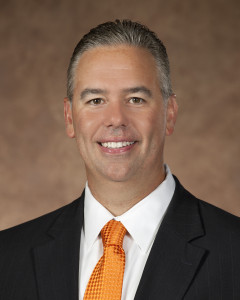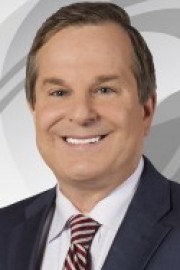Bank Chairman and CEO
Mentor, Sean Kouplen
YPNG Mentor Sean Kouplen is the Chairman and CEO of Regent Bank and was recently honored as one of Oklahoma’s Most Admired CEO’s, one of OSU’s Top 50 MBA Graduates of the century and named to Oklahoma Magazine and Tulsa Business Journal’s Top 40 Under 40 lists. Sean has also been active in the community and served as the president of the Oklahoma State University National Alumni Association, Bixby Chamber of Commerce and Rotary Club of Bixby. He has also served on the board of directors of Junior Achievement, the Tulsa Chamber Small Business Council, the Tulsa Metro Chamber Small Business Council, Tulsa Zoo Board and Tulsa Young President’s Organization. Sean actively mentors young people and is the author of the book “ 12 Life Lessons Every Graduate Should Know”.
Sean did not go to college with the idea of becoming a banker. He studied agricultural economics and finance and expected to work with his father and grandfather on the family ranch after graduation. But the agricultural economy was in a recession in the 1980s and Sean’s father told him he needed to look for a different career. He was president of the OSU inter fraternity council and found himself in a meeting with the college president and some alumni after he had talked to his father. At that meeting he was asked what career he wanted to pursue when he graduated. Sean was sitting by a banker and on the spur of the moment said had an interest in banking. This led to an opportunity to pursue a banking internship between his Junior and Senior year and his first job after he graduated. Sean started as a financial analyst and three years later was recruited by another bank as a loan officer and Chief Operating Officer. He was promoted to President and later recruited for a position as Chief Operating Officer for another community bank in Tulsa where he also became President. Sean became a banking entrepreneur in 2008 putting together an investment group that purchased Regent Bank, a community bank in a town northeast of Tulsa. Sean’s vision was to build a premier business bank and a few months later his group opened a branch in Tulsa. But the recession hit in the fall of 2008. The new bank struggled at first but soon began to grow as the economy recovered. By 2015, Regent Bank was one of the fastest growing banks in Oklahoma, had quadrupled in size and added a third branch in Oklahoma City.
In his article, Sean talks about what it is like working in different positions in a bank and the two main career paths you can follow, community banking and institutional banking. There are important differences to consider if you decide to pursue a banking career. Because Sean has experience in a variety of banking positions including the highest levels of management and as an owner, his article will be of interest to any young person who wants to learn more about how to establish their own successful career path in banking.
Overview
I grew up working with my father and grandfather on a ranch in Beggs, Oklahoma. I went to Oklahoma State University to get an agricultural economics and finance degree and expected to go back and work with them after I graduated from college. But during the time I was at OSU, agriculture was going though a hard time because of low prices for cattle and grains. My father booted me out of the family business and told me that I needed to look for another career. I had been active in a fraternity while I was at OSU and became the inter fraternity council president my junior year. I was at a meeting with the OSU president and some alumni where I was representing the fraternities and was asked by the president what it was that I wanted to do after graduation. My Dad had just told me that I wasn’t going back to the ranch and I had not really come up with an idea for a new career. I happened to glance over and look at the nametag on one of the alumni that said he was a banker. So I told the president that I wanted to be a banker when I graduated. He was enthusiastic and helped me get a bank internship that summer between my junior and senior year. I found I liked working at the bank and that internship led to a job when I graduated. I was also told something by my grandfather when I was younger that encouraged me to become a banker. He said that when people first moved into a new town they always want to meet the banker because everyone would most likely need to borrow money at some point. I liked the idea that people in the community would seek me out if I were a banker like my grandfather had said. I did not know it at the time, but because Oklahoma had a large agricultural sector, many of the bankers in the state have agricultural economics and finance degrees. So even though I did not plan it, my degree was actually a good fit for a career in banking.
My first job out of college was as a financial analyst where I looked at proposals to buy other banks or analyzed locations where our bank could expand. I also got involved in leasing and installing one hundred ATMs and marketing the bank’s services. This gave me experience analyzing and learning the operational aspects of banking and developing marketing programs. But I never made a loan or dealt directly with customers in that job. I wanted to be a loan officer and not a project manager. So after three years at that bank, I moved when I was offered a job as COO and loan officer at a nearby community bank. I found I was good at managing people and bringing in new business, and I was quickly promoted. Unfortunately, our bank sold after I had been there three years.
I had recently gotten married and my wife lived almost two hours away in Tulsa. We knew that one of us would eventually have to move and it turned out to be me. I found a job as COO at a community bank in Bixby, a growing suburb of Tulsa. We grew rapidly, added another branch and I was able to hire all my own people. I really like leading this community bank because I could set the vision and lead the team in the direction I felt would best grow the business. In 2005, the minority shareholders purchased all of that bank and I ended up reporting to a large group of family members. They were a wonderful family, but my career path there was now very limited. So, I accepted a position as President of another Tulsa community bank and served there until 2008.
In 2008, a friend who’s family owned a community bank in a town northeast of Tulsa approached me. Their bank had been in the family since the 1940’s but was not doing well even after they had made some management changes. My friend was the Chairman and had lost his President, so he called to see if I knew anyone who would be good for the position. I suggested that he sell the bank. The bank had a lot of problems that needed to be addressed and the new management they had brought in had not been successful doing this.
I didn’t hear from him for a couple weeks until he called me and asked for a meeting. He said that the family didn’t want to try hiring another new manager, had agreed to sell the bank and that he wanted to sell it to me. I had not told him I wanted to buy the bank, so it came as a surprise. But I thought that it might be a good opportunity because I was confident that I could turn it around and use it as a base to expand. I put together a group of eighty investors called Regent Capital Corp. and purchased the bank on April 1, 2008. We entered the Tulsa market as Regent Bank in August 2008 by opening a full-service bank on the southwest corner of 71st Street and Yale Avenue. But our timing was not good. By the fall of 2008, the recession had hit and the bank struggled. Some of my investors were worried. But everyone stayed with me and the results have been outstanding. Regent Bank is among Oklahoma’s fastest-growing banks and has quadrupled in asset size during the last seven years and we also added another branch in Oklahoma City in 2014.
My strategy with Regent Bank was to become a premier business bank by inviting business owners to experience a different way of banking. We believe that people bank with people not banks. We try to develop relationships with our clients that extend far beyond typical deposit and lending practices. Plus our ownership group is mostly made up of families who own businesses. They serve as our eyes and ears in the marketplace and help us take advantage of business opportunities.
We also use technology to better serve a large number of clients with just a limited number of physical locations. For example, we mix old-fashioned conveniences like courier service with new technologies such as Desktop Depositor, which allows our customers to deposit checks from their offices.
The Business of Banking
As a banker you basically buy and sell money. You attract deposits by paying interest and providing services for customer accounts and you earn interest on the money you loan. You should understand that margins are small in banking, about 1%. That means that to make a million dollars in income for your bank you need to make loans of one hundred million dollars. This kind of margin does not give you much room for loan losses. Maintaining credit quality in a bank’s loan portfolio is critical.
While deposits are the primary source of loanable funds for almost every bank, shareholder equity is also an important part of a bank’s capital. Regulatory ratios are based on the amount of shareholder capital and are important because while deposits can be withdrawn, shareholder capital stays in the bank. So being well capitalized is an important buffer.
Complying with bank regulations is burdensome and is the main thing most people don’t like about banking. We have over thirty-seven audits per year at our bank from all the various state and federal regulatory agencies and we only have sixty employees. So a lot of our people’s time is taken up with compliance. Many of the most burdensome regulations were part of the new laws that were passed after the problems that occurred in the banking sector during 2008 and 2009. For example, mortgage loans have now become very complicated and can be over two hundred pages. We never had problems with our mortgage loans. But those companies who were packaging and selling loans where the packagers were passing on the credit risk and the originators generating the loans had low credit standards caused the government to write these new rules that now affect every lender.
Being a Banker
A good banker is able to bring in business by building client relationships. While my grandfather told me that everyone comes in and meets the banker when people move into a new town, much of the new client business today is from bankers getting out and meeting people and building personal relationships with them. I did this myself by being active in the community in things like the Chamber of Commerce, Rotary, Junior Achievement and the Boards of other community organizations.
I good banker also learns his client’s business. This is one of the most interesting parts of the job for me. While loan officers at large banks generally specialize in particular industries, a community banker gets the opportunity to learn about a wide variety of businesses. Because all businesses are affected by business cycles, you need to be able to maintain client relationships in good times and bad. This means you have to learn how your client’s business works so you can be a good advisor to them as economic conditions change.
One of the things I also enjoy about banking is that you get to work with high quality people. It is a respected career with good hours that attracts smart people who are friendly and outgoing.
How to Prepare
- It is important that you take courses in accounting and finance. But you also need to take courses in marketing. As a banker, you have to develop programs to attract depositors and borrowers to drive revenue.
- I think that an MBA can be helpful as you move up to positions with more management responsibility. But you can get this degree while you are working and sometimes your bank will pay for you to attend these classes. I got my MBA after I graduated and had a job with a bank.
- College will offer you opportunities for leadership roles in student organizations and student government. These are important to give you experience running a meeting and speaking in front of people and will also allow you to start building a network of personal contacts that can help when you look for internships and employment.
- Bank internships are available for promising students in the summer normally between their junior and senior years. We take at least one intern every year at our bank and have always offered jobs to good interns after they graduate.
- When you get out of college, I would recommend that you look at being a financial or credit analysis in a larger bank as a first position. Making loans is what drives revenue and as a credit analyst you will learn how to evaluate customer credits. This is important to later becoming a good loan officer.
- After a few years working as an analyst, you are going to have to make a decision about whether or not you want to work at a large, institutional bank or a smaller community bank. Large banks will give you more upward mobility in the organization and generally pay better. Community banks have fewer opportunities for advancement within a particular bank because of their size. But you will build more personal relationships and have more influence on the organization if you work at a community bank especially if you are promoted to management.
Summary
I have enjoyed my career in banking in large part because I have been fortunate to have reached management positions at an early age where I could provide the vision and direction for the bank and hire my own people. I was able to do this because I chose to begin my career at smaller, community banks where my ability to generate new business and market my bank’s services was highly valued. This also put me in a position to be given an opportunity to put together an investor group to acquire a bank and gain an ownership position. I think banking can be a good career for you as well if you like working with people and can build strong relationships. Banking is not one of the highest paid professions. But you can live comfortably and as I say in my book, “ By mastering skills and processes, you can balance an enjoyable, successful career with a rewarding personal life”.
Editor’s Note: Here is a link to Sean’s webpage that talks about his book “Twelve Life Lessons Every Graduate Should Know” and also gives more information about his other accomplishments including teaching and speaking.
http://twelvelifelessons.com/about-the-author
US Bureau of Labor Statistics Salary Data for Loan Officers
The median annual wage for loan officers was $62,620 in May 2014. The median wage is the wage at which half the workers in an occupation earned more than that amount and half earned less. The lowest 10 percent earned less than $33,050, and the highest 10 percent earned more than $128,390.
The form of compensation varies widely by employer. Some loan officers are paid a flat salary; others are paid a base salary plus a commission for the loans they originate. Loan officers also may receive extra commission or bonuses based on the number of loans they originate or how well the loans perform.









